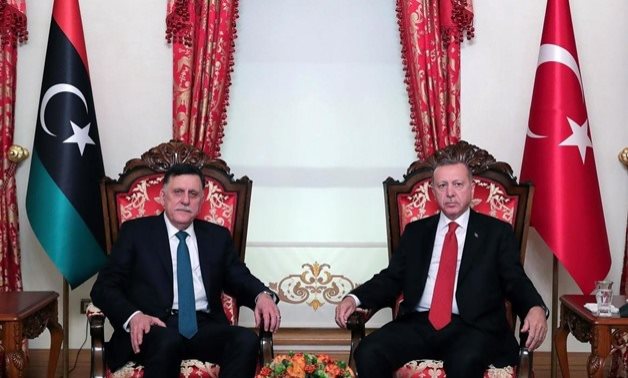
Turkish President Tayyip Erdogan meets with Libya's GNA Prime Minister Fayez al-Sarraj in Istanbul, Turkey, November 27, 2019. Presidential Press Office, Reuters
CAIRO – 17 July 2020: Saleh Al-Fandi, Head of Libya's Supreme Tribal Council denounced the Government of National Accord for resorting to Turkey’s “colonialism” amid a state of division that has extended for years between the GNA and both the Libyan National Army and the Parliament.
This comes as Egypt’s President Abdel Fattah El Sisi met with Libyan tribal leaders in Egypt to discuss the possibility of sending the Egyptian army to Libya to eliminate militias and terrorist groups and curb foreign interference, he said.
“We had known that colonialism comes to a state by force, occupies cities and kill people, and everyone consolidates to expel it,” Fandi told Egypt’s CBC eXtra news, denouncing the GNA for bringing the “Turkish occupation” which he said brought dozens of mercenaries and ISIS elements to the country.
Libya is suffering a severe division between two factions; the Libyan Parliament and the Libyan National Army (LNA) led by Field Marshal Khalifa Haftar in the east and the GNA, led by Fayez Al-Sarraj. The latter is internationally recognized but is not accepted by the Parliament.
Hundreds were killed in continuous battles between the LNA and the forces of the GNA, over the past year.
In his Thursday meeting with tribal leaders, President Sisi said one of the parties to the Libyan conflict (apparently referring to the GNA) fell under control of a foreign power and lacked the political will to apply ceasefire. This foreign power (apparently referring to Turkey) uses this faction for certain purposes in the region, regardless of the Libyan national interest, he added.
Egypt Today displays Sisi’s most prominent remarks during the conference in points:
- Egypt will not allow Libya to become a new hotbed for terrorism or outlawed elements, even if it means that Egypt has to intervene directly in Libya.
- Egypt will not stand idly as it watches activities that threaten its national security.
- Egypt will intervene at the Libyans' request and will withdraw upon their order.
- Egypt has the strongest Army in the region and Africa, but it is wise and does not assail or invade other territories.
- The Egyptian Army needs the Parliament’s approval to intervene in Libya.
- The Egyptian Army, in the event of intervening, will be led by Libyans carrying the Libyan flag.
- One of the parties to the Libyan conflict (apparently referring to the Government of National Accord) fell under control of a foreign power and lacked the political will to apply ceasefire.
- This foreign power (apparently referring to Turkey) uses this faction for certain purposes in the region, regardless of the Libyan national interest.
- Egypt is willing to receive and train youth from tribes to help build a Libyan national army.
- Sirte-Jufra red line is a call for peace by Egypt to activate the political solution in Libya.
- Egypt rejects foreign interference in Libya and seeks political, social and military stability.
- Mercenaries are still being moved from Syria to Libya, to seize Libyan resources, especially oil, and threaten the security of neighboring states.
Comments
Leave a Comment